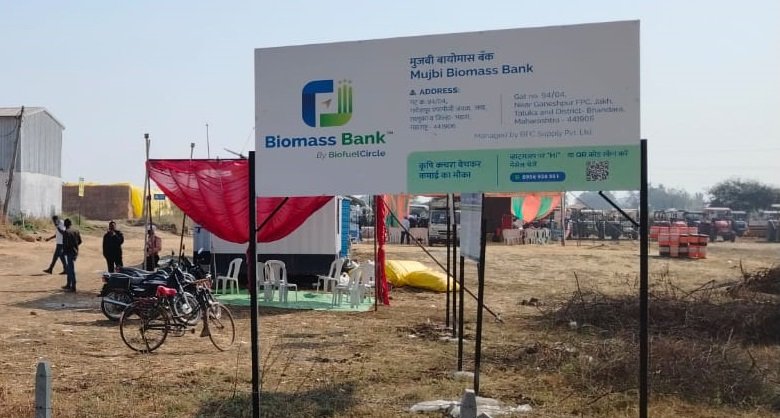BiofuelCircle scales up its rural infrastructure to build sustainable biomass aggregation in Nagpur
With this move, the company aims to aggregate 40,000 metric tonnes (MT) of paddy straw this season, while generating new income opportunities for local farmers.
BiofuelCircle, India’s leading digital platform for the bioenergy supply chain, is expanding its reach into rural India to build sustainable biomass aggregation. In its latest initiative, the company is setting up eight new warehouses—four near Mauda and four near Bhandara in Nagpur—to support biomass aggregation at scale. These warehouses will be equipped with the latest technology equipment including slashers, balers, rakers, etc. With this move, the company aims to aggregate 40,000 metric tonnes (MT) of paddy straw this season, while generating new income opportunities for local farmers.
To engage with local farmers directly, BiofuelCircle concluded an event in Mujbi near Mauda. Local administration representatives graced the event and launched the Mujbi Biomass Bank, signaling strong community support for this initiative. The officials discussed the importance of effective methods for aggregating paddy straw and emphasized on how initiatives like Biomass Banks can support the aggregation process while maintaining sustainability in the ecosystem.
The event saw participation from over 100 local farmers from surrounding villages. A live demonstration showcased how agri-waste bales are created, which generated considerable interest among farmers. These farmers showed keen interest in participation in paddy straw aggregation.
BiofuelCircle’s digital platform has deployed GPS and Telematics based apps to promote rural biomass businesses. It is aimed at streamlining an efficient system for the collection and transportation of paddy straw. This enables creation of rural biomass businesses in the state.
It has also deployed advanced, digitally integrated machines like balers to collect and process stubble. Through this effort, BiofuelCircle envisions building a circular economy where agricultural residue is converted into valuable resources, supporting rural income generation and contributing to a cleaner environment.
BiofuelCircle’s Biomass Bank initiative plays a central role in this effort by offering a secure and transparent platform for farmers to sell their paddy straw. The collected residue will be processed into biofuels and other bio-based products, providing farmers with a reliable income stream while tackling the environmental concerns associated with stubble burning. Currently, the company has 31 warehouses which it plans to double across key agricultural states including Uttar Pradesh, Haryana, Maharashtra, Gujarat, and Andhra Pradesh among others in this year.
Suhas Baxi, Co-Founder and CEO of BiofuelCircle, stated, “India has a tremendous opportunity to harness its vast biomass potential—235 million metric tonnes annually to drive sustainable energy transformation. Through our Biomass Banks, we are not only creating a market for agricultural waste but also empowering farmers and rural communities to become key players in the bioenergy ecosystem.
Each Biomass Bank serves as a hub, catering to clusters of villages and enabling over 2,000 farmers to monetize their agri-waste while creating new income-generation avenues for tractor owners and local entrepreneurs. This year, we are launching 50 Biomass Banks across India, including 10 in Maharashtra in locations such as Nagpur, Kurkumbh, Nagothane, and Palghar.
By reaching out to over 20,000 farmers in these regions, we aim to foster a thriving rural bioeconomy, demonstrating that sustainability and profitability can go hand in hand”, he adds.
BiofuelCircle’s ongoing efforts in Nagpur and its surrounding regions are part of a broader mission to build a reliable and efficient biomass supply chain in India. By aggregating agricultural residue and converting it into a valuable resource, BiofuelCircle is not only providing a solution to stubble burning but also generating new economic opportunities for farmers, tractor operators, and rural entrepreneurs.
With this move, the company aims to





